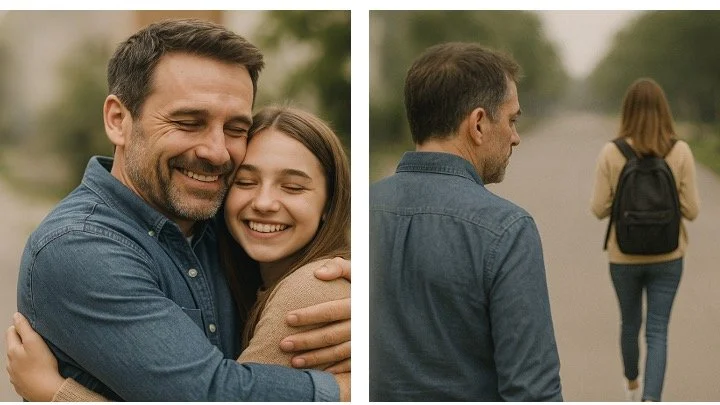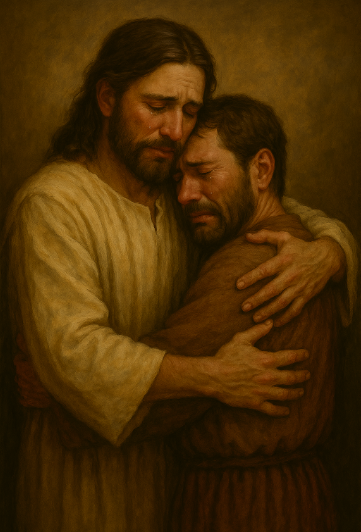A Decade in Recovery - My Mess is His Message
/The road to recovery isn’t perfect, but it is filled with progression and learning and healing.
Read MoreThe road to recovery isn’t perfect, but it is filled with progression and learning and healing.
Read MoreIf you have a child going into Middle School this year - and especially if it is your first - you are likely in for an emotional roller coaster ride. In my experience - and I’ve had a lot of it - in one moment he or she will be clingy, only in the next moment to not want to be seen near you at the bus stop or at a store or anywhere.
This morning, my daughter told my wife she didn’t want her to walk her to the bus stop, which my wife is trying not to let hurt her feelings, and in the next moment, she and I had this exchange:
“Daddy …”
“Yes?”
“I love you!”

Within minutes, she both wanted my wife to trust her and give her some slack - and then, contrarily, also wanted to anchor to me and be assured of my acceptance and love.
I see God smiling in Heaven during these moments.
How often have I thrown myself down at His feet begging and pleading for connection or peace, or a particular blessing, only to then turn to social media or food, or another vice, essentially drop-kicking Him to the curb?
It is my experience to enjoy the anchoring moments with my daughter. Lean in when she wants to connect. And then - as hard as it is - provide a lot of slack in the emotional tether the next moment so she can go and explore and find out who she is.
But when she is open to it, I have to consciously be present in that moment. This may mean stopping whatever I’m doing. Not in an unhealthy, “I don’t have any boundaries” way - but in a “she is growing up fast and not going to be under my roof forever, I’m going to soak this up right now because I’ll need the emotional resiliency later” kind of way.
And this reminds me to check in with my own Father often. If He fills my emotional needs, then I do not have hunger or an unscratchable itch that I am tempted to satiate with things that don’t leave me feeling better about myself.

Just before I began my path of recovery, if you had asked me if I believed Jesus loved me, I would have said, “Of course!” But, looking back, it was only something I knew in my head. I did not feel it in my heart.
It wasn’t just ignorance, either, I was actively keeping his love away. I did not love myself, did not see how anyone could, and I certainly did not want the love of the most perfect being in the universe. I didn’t deserve it, so I couldn’t receive it. It was my therapist who started to break those paradigms. His name was Corey Holmgren.
When I first met Corey, I was already breaking down the facade I had so carefully built up, and was now identifying with the shameful me underneath. But Corey helped me to see that underneath the shameful me, there was also a wounded me, and under the wounded me was a Son of God. And it was that Son of God, not the facade, the shame, or the wound, who was the real me. And that Son of God was lovable forever.
Where this really hit home was when Corey introduced me to a brotherhood of men also seeking recovery, and I cannot describe how paradigm-shifting of an experience it was to tell that brotherhood all of my deepest shames and regret, all the things that I thought it would kill me to tell to another person, and to have them respond by still loving me and wanting to be my friends. I didn’t know that that could happen. We were actively testing the promise in James 5:16: “Confess your faults one to another, and pray one for another, that ye may be healed,” and we found that promise to be true. And by seeing that sort of unconditional love in other men, I started to believe that that love could be in God and Jesus as well.
In time, I came to hear these messages firsthand from my Savior. He and I had long conversations, where He took my mind back to experiences in my past, experiences that had built a wall between me and Him, and He showed me how His frame of that experience was different from my own, and that the wall was only on my side, and that I could take it down now, if I wanted, because it was keeping out the love that He had always had for me.
I became much more confident in the love of Christ, but there is an essential pairing here. Being loved by Jesus brought me to a certain level of redemption, but being able to sincerely love Him back was what made it complete.
I learned this on my recovery journey when I had a relapse. By that point, I genuinely felt comfortable in the love of Jesus. I still felt sure of it, but for the first time, I realized that it wasn’t complete. It was a melody that needed a harmony. I prayed for God to come into my cold heart, but instead I felt the impression to start looking for a hymn to sing. Very quickly, I was led to a hymn I had never heard before, called My Jesus, I Love Thee. I knew I had to sing it, out loud. Here is the first verse of that hymn:
My Jesus I love Thee, I know Thou art mine
For Thee all the follies of sin I resign
My gracious Redeemer, my Saviour art Thou
If ever I loved Thee my Jesus 'tis now
This song was a redeclaration of my love to Jesus, and as I sang it, I felt my heart come back to life. The tears flowed, and I learned that just as there is a Son of God inside of me that can always receive Jesus’s love, that Son of God can always love him back, even in my lowest moments.
A one-way love is charity; but reciprocated love is a relationship, and relationship is what Jesus ultimately seeks to redeem us back to. Relationship, being known and loved by Christ, and knowing and loving him back, is the literal definition of eternal life and the entire purpose of the gospel. “We love him, because he first loved us. He that loveth not knoweth not God; for God is love. And this is life eternal, that they might know thee the only true God, and Jesus Christ, whom thou hast sent.” 1 John 4:19, 1 John 4:8, John 17:3.
By Abe, Writing Team